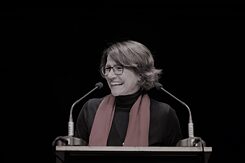Conversation Dealing with Disenchantment: Aesthetic Enlightenment and the Art of Decolonization
with Tania Bruguera, Andrea Patiño Contreras, Nikita Dhawan, and Maria do Mar Castro Varela
For those planning to attend in person (includes glass of wine, snacks and good company), we encourage you to RSVP here.We will be recording the panel - give us 2 weeks and check our archives to view the video.
In times of multiple crises, it is imperative to (re)examine the mandate of art. What role should art play in the face of rising social injustices? Could critical artistic practices facilitate transnational justice and democracy, protecting and promoting human rights? Or should art remain non-purposive? Given that art functions within structures of capitalism and coloniality, the role of art and art institutions is ambivalent. Can the political labor of training the imagination mitigate unjust structures and practices?
To find answers to these pressing questions, Nikita Dhawan and Maria do Mar Castro Varela, presently fellows at the Thomas Mann House in L.A., discuss with installation and performance artist Tania Bruguera and video journalist Andrea Patiño Contreras if and how an aesthetic education can help us imagine a planetary future.
Biographies:
The installation and performance artist Tania Bruguera researches ways in which art can be applied to everyday political life, focusing on the transformation of social affect into political effectiveness. Her long-term projects have been intensive interventions on the institutional structure of collective memory, education, and politics.
Bruguera earned her MFA in performance from the School of the Art Institute of Chicago. She is the founder and director of Cátedra Arte de Conducta (Behavior Art School), the first performance studies program in Latin America. Bruguera’s work has been exhibited at documenta 11, the Guggenheim Museum, and Tate Modern and also at the Bienal Iberoamericana de Arquitectura y Urbanismo, the Gwangju Biennale, the Istanbul Biennial, and Shanghai Biennale. Her work is in the permanent collections of many institutions around the world, including the Bronx Museum of the Arts, the Museo Nacional de Bellas Artes de La Habana, and the Museum of Modern Art, in New York.
Andrea Patiño Contreras is a bilingual video journalist and editor from Bogotá, Colombia, currently based in Boston. She loves all aspects of filmmaking: from the early stages of research, to the most intricate details of post-production. Most of her work revolves around questions of migration and mobility, and the Latino community in the U.S. and across Latin America. She also has extensive experience covering gender and sexual violence. Her latest film #IamVanessaGuillen, explores the mental health impact of survivors of military sexual violence.
Contreras' work as a journalist is heavily informed by her love for cultural anthropology, which trained her to look at the world through a human-centered lens and to stay curious. Her work has been recognized by the Hillman Foundation, the National Murrow Awards, the Gracie Awards and Picture of the Year International among others.
She is also the co-founder of the visual production studio Rabbit Raccoon and an aspiring ceramics artist.
Nikita Dhawan holds the Chair in Political Theory and History of Ideas at the Technical University Dresden. Her research and teaching focuses on global justice, human rights, democracy and decolonization. She received the Käthe Leichter Award in 2017 for outstanding achievements in the pursuit of women's and gender studies and in support of the women's movement and the achievement of gender equality. She has held visiting fellowships at Universidad de Costa Rica; Institute for International Law and the Humanities, The University of Melbourne, Australia; Program of Critical Theory, University of California, Berkeley, USA; University of La Laguna, Tenerife, Spain; Pusan National University, South Korea; Columbia University, New York, USA. Select publications include: Impossible Speech: On the Politics of Silence and Violence (2007); Decolonizing Enlightenment: Transnational Justice, Human Rights and Democracy in a Postcolonial World (ed., 2014); Reimagining the State: Theoretical Challenges and Transformative Possibilities (ed., 2019); Rescuing the Enlightenment from the Europeans: Critical Theories of Decolonization (forthcoming). In 2023 she was Gerda-Henkel-Visiting Professor at Stanford University and Thomas-Mann-Fellow.
María do Mar Castro Varela is a professor of Pedagogy and Social Work at the Alice Salomon University in Berlin and lectured amongst others at the University of Basel; the Zurich Academy of Arts, the University of Innsbruck, and the University of Vienna. She holds a double degree in Psychology and Pedagogy from the University of Cologne and a Ph.D. in Political Science from the Justus-Liebig-University Giessen. Her research interests besides Postcolonial Theory lie in Gender and Queer Studies, social justice, digital hate, and emancipation. She held guest professorships at the University of Oldenburg and the University of La Laguna in Tenerife. She was visiting scholar at George Mason University, Virginia, the Institute for Conflict Analysis & Resolution (ICAR), the University Busan in South Korea, and the University of Costa Rica. In 2014 she was visiting fellow of the Institute for International Law and the Humanities in Melbourne, Australia, and in 2015/16 she was senior fellow at the Institute for Human Sciences (IWM) in Vienna. In 2020 she was awarded the Sir Peter Ustinov Guest Professorship at the Institute for Contemporary History, University of Vienna, and in 2023 the Thomas Mann Fellowship. María do Mar Castro Varela is the founder of the bildungsLab* (www.bildungslab.net) and Chair of the Institute for Contrapunctual Social Analysis. Selected Publications: Untimely Utopias. Migrant Women between Learned Hope and Self-Invention; Postcolonial Theory. A Critical Introduction (co-authored); Post/Pandemic Lives. A New Theory of Fragility (co-authored) [all published in German] and TransHealth. Global Perspectives (co-edited).

